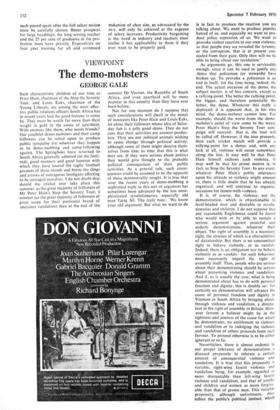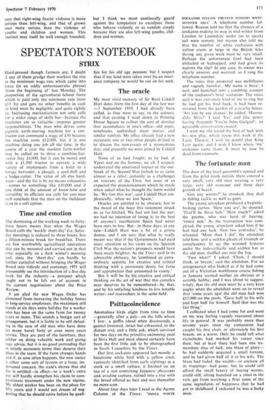VIEWPOINT
The demo-mobsters
GEORGE GALE
Such characteristic children of our time as Peter Hain, chairman of the Stop the Seventy Tour, and Louis Eaks, chairman of the Young Liberals, are among the most effec- tive public relations officers South Africa has in recent years had the good fortune to come by. They must be worth far more than their weight in gold to the cause of apartheid. With enemies like them, who needs friends? Our youthful demo-mobsters and their camp followers can be relied upon to produce public sympathy for whatever they happen to be demo-mobbing and camp-following against. The Springboks have returned to South Africa generally admired for the forti- tude, good manners and good humour with which they have toured the rugby football grounds of these islands and borne the slings and arrows of outrageous hooligans affecting to be outraged moralists. I do not doubt that should the cricket tour take place this summer, as the great majority of followers of Mr Peter Hain's Stop the Seventy Tour, I summer (as the great majority of followers of great scope for their particular brand of unctuous vandalism) then at the end of the summer Dr Vorster, the Republic of South Africa, and even apartheid will be more popular in this country than they have ever been before.
Not for one moment do I suppose that such considerations will dwell in the minds of innocents like Peter Hain and Louis Eaks, let alone their followers whose idea of Satur- day fun is a jolly good demo.. They do not care that their activities are counter-produc- tive. They are not political animals wishing to cause change through political activity, although some of them might deceive them- selves from time to time that this is what they are. If they were serious about politics they would give thought to the probable political consequences of their public activities. As a general rule, such conse- quences could be assumed to be the opposite of those demonstrably sought. It is true that over the recent years of demo-mobbing a sophistical reply to this sort of argument has sometimes been advanced by the less unso- phisticated revolutionaries, especially old man Tariq Ali. The reply runs: 'We know your old argument. But what we want to do
is in fact to produce the reaction you are talking about. We want to produce popular hatred of us, and especially we want to pro- duce police repression of us. We want to provoke violent reaction to our own violence, so that people may see revealed the tyranny, or the corruption, that is at present con- cealed from their gaze. Only then will we be able to bring about our revolution.'
As arguments go. this one is serviceable enough, since it can be used to justify any demo that policemen (or stewards) have broken up. To provoke a policeman is an end in itself; for the time being, indeed, the end. The actual occasion of the demo, the subject matter, is of less concern, except as a rallying-point. The better the rallying-point, the bigger, and therefore potentially the better, the demo. Whenever this reply is deployed, it is apparent that, in his own mind, the demo-mobster cannot lose. For example, should the worst from the demo- mobster's point of view come to the worst, Peter Hain's Stop the Seventy Tour cam- paign will succeed: that is, the tour will be called off. However, if the tour proceeds, then each cricket match will provide a rallying-point for a demo; and, with any luck at all, violence will occur somewhere along the line. It may well be that Peter Hain himself eschews such violence. It may welt be that his prime motive is, in fact, to Stop the Seventy Tour. In any event, whatever Peter Hain's public utterances upon his attitude to violence might amount to, there is little doubt that he has already organised, and will continue to organise, occasions for demos-with-violence.
It is, of course, the violence, not the demonstration, which is objectionable to level-headed men and desirable to revolu- tionaries and children. I do not suppose that any reasonable Englishman could be found who would wish or be able to sustain a serious argument against peaceful and orderly demonstrations, whatever their object. The right of assembly is a necessary right, the absence of which is a characteristic of dictatorship. But there is no concomitant right to behave violently, or as vandals. Indeed, there is an obligation not to behave
violently or as vandals : for such behaviour must necessarily imperil the right of assembly itself. Thus, people who are serious about their demonstrating should be serious about preventing violence and vandalism. And if, as is usually the case, what is being demonstrated about has to do with personal freedom and dignity, this is doubly so : for certainly no demonstration will advance the cause of personal freedom and dignity in Vietnam or South Africa by bringing about, through violence and vandalism, a diminu- tion in the right of assembly in Britain. How-
ever fervent a believer might be in the rightness and justness of the cause for which
he demonstrates, no entitlement to violence and vandalism or to indulging the violence and vandalism of others proceeds from such fervour. To pretend otherwise is to be either ignorant or to lie.
Nevertheless, there is almost endemic in our proper tolerance of demonstrations a diseased propensity to tolerate a certain amount of consequential violence and vandalism. It is true that this propensity is variable, right-wing fascist violence and vandalism being, for example, regarded as more disreputable than left-wing fascist
violence and vandalism, and that of youths and children and women as more forgive- able than that of grown men. This variable propensity, although unfortunate, does reflect the public's political instinct,111
w_ch says that right-wing fascist violence is more serious than left-wing, and that of grown men more serious than the violence of youths and children and women. This instinct may itself be well enough founded;
but I think we must continually guard against the temptation to exculpate those who behave violently or as vandals simply because they are also left-wing youths, chil- dren and women.



































 Previous page
Previous page